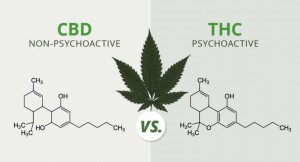It started with Reefer Madness, and now there are all sorts of cannabis myths out there. So we’re on a mission to clear some of those up.
CBD vs THC — Which Is Medical?
 Many people believe that THC is strictly the recreational form of cannabis, and CBD the only medical component. However, this couldn’t be further from the truth. In fact, milligram for milligram, THC is far more therapeutic than CBD. They each have significant health benefits, but can’t be used interchangeably.
Many people believe that THC is strictly the recreational form of cannabis, and CBD the only medical component. However, this couldn’t be further from the truth. In fact, milligram for milligram, THC is far more therapeutic than CBD. They each have significant health benefits, but can’t be used interchangeably.
The one thing that they both treat well is pain. Some people find that they can manage their pain with THC, and are able to handle the possible amounts of euphoria that they may experience (although with appropriate dosing, you should only be brought up to baseline and not exceed it into euphoria). However, people sensitive to THC can use CBD for their pain instead. The dose may be different — 5mg of THC vs 25mg of CBD to treat the same amount of pain — but for many patients, THC is not something they are willing to use.
As far as treating sleeplessness, THC is far and away the superior cannabinoid. CBD has no known sedating effects, where THC-rich products are known to make the consumer drowsy.
Anxiety is another condition that is very specific. THC can commonly make consumers more anxious and paranoid, and is typically not used to remedy these conditions. However, CBD is known to act on the 5-HT1A receptor, a serotonin receptor that when activated decreases aggression and impulsiveness, inhibits drug-seeking behavior and increases sociability. This makes CBD an amazing choice for anxiety and PTSD.
Cannabis and Schizophrenia
For a long time, it has been believed that cannabis can cause or trigger schizophrenia. The available data indicates that this is true, but not quite in the way that people believe. Cannabis high in THC acts on the CB1 receptors in the brain, which can cause a chemical reaction and create environmental conditions that could encourage a genetic predisposition for schizophrenia to come to fruition. Cannabis itself does not cause schizophrenia out of nowhere. Cannabis can also weaken the CB1 receptors in the brain with heavy use, which would cause a disruption to the D2 dopamine receptor and lead to an overproduction of dopamine, which can cause psychosis. CBD, on the other hand, is showing great promise for use as a therapeutic drug for schizophrenics. CBD is thought to have antipsychotic properties, and can reduce some of the negative effects of schizophrenia, improving social interaction and working memory deficits. CBD also doesn’t come with the unfortunate side effects of traditional antipsychotics, like weight gain.
How CBD Works
CBD has long been claimed as a “non-psychoactive,” which is not entirely true. The definition of psychoactive is “affecting the mind,” which CBD absolutely does. CBD is certainly non-euphoric; it doesn’t give the sensation of being “high” users feel from THC. However, CBD absolutely affects the mind. It is well known for its amazing effect on anxiety and PTSD, through its action on serotonin receptor 5-HT1A, as well as its ability to treat epilepsy.



